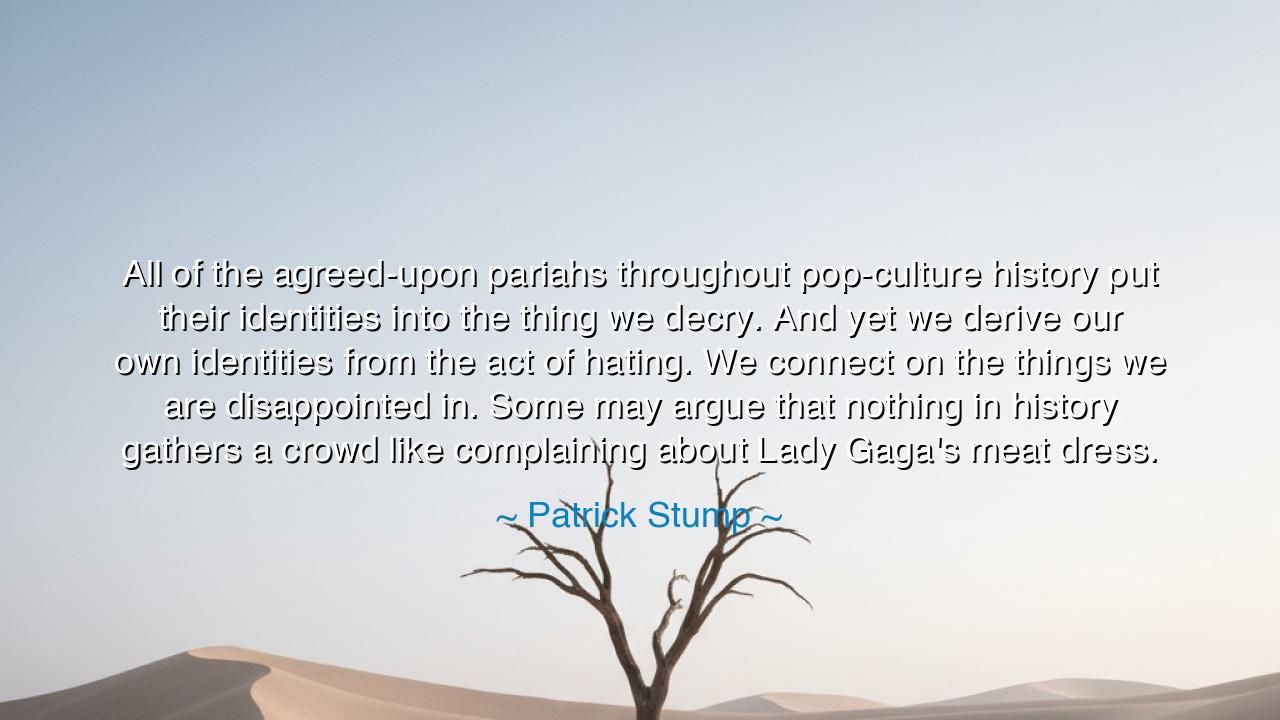
All of the agreed-upon pariahs throughout pop-culture history put
All of the agreed-upon pariahs throughout pop-culture history put their identities into the thing we decry. And yet we derive our own identities from the act of hating. We connect on the things we are disappointed in. Some may argue that nothing in history gathers a crowd like complaining about Lady Gaga's meat dress.






“All of the agreed-upon pariahs throughout pop-culture history put their identities into the thing we decry. And yet we derive our own identities from the act of hating. We connect on the things we are disappointed in. Some may argue that nothing in history gathers a crowd like complaining about Lady Gaga’s meat dress.” — Patrick Stump
Hear these words, O children of the age of noise and image, from Patrick Stump, a poet disguised as a musician, who looked upon the fever of the modern world and spoke of its strange hunger for disapproval. In this reflection, he reveals the paradox of our time: that those whom society mocks or condemns — the pariahs of culture — are often the ones who create with fearless honesty, while the rest, afraid to dream, take refuge in the comfort of complaint. He shows us that hatred, dressed as virtue or wit, has become a ritual of belonging, a substitute for meaning. We build our identities not upon what we love, but upon what we reject.
The origin of this thought lies in the modern age of celebrity and spectacle, where every act of creation is met with judgment as swift as lightning. Stump, as the frontman of Fall Out Boy, knew well the rhythms of fame — the adoration and the ridicule that move in equal measure. In speaking of Lady Gaga’s meat dress, he invokes not mockery but metaphor. The dress, made of raw flesh and worn without apology, became a symbol of shock, protest, and art — and yet what endured most in public memory was not the statement, but the complaint. The crowd did not gather to understand, but to judge; not to question their discomfort, but to connect through their outrage. Thus, Stump captures the eternal pattern of culture: the creator gives form to something daring, and the crowd, unable to face its reflection, binds itself together in scorn.
This phenomenon is not new. The ancients, too, had their pariahs — those who dared to move beyond the limits of comfort. Consider Socrates, who, by asking the citizens of Athens to examine their lives, became the most hated man in the city. They derided him, called him corruptor of youth, and sentenced him to death. Yet Socrates, like Gaga with her unflinching self-expression, embodied his truth so completely that his very existence became a mirror to others’ hypocrisy. The Athenians connected through their disapproval, their shared hatred of the discomfort he caused. But centuries later, his name endures as the father of philosophy, while the chorus of his accusers has faded into dust. So it has always been: the visionary creates, and the fearful unite against creation.
Stump’s words, though born of pop culture, speak of something deeper — the psychology of belonging. Humanity is a social creature, and in every age, we have sought connection. Yet too often, we find unity not in the pursuit of goodness, but in the safety of shared disdain. It is easier to mock than to marvel, easier to reject what confuses us than to explore it. When the crowd laughs together, it feels powerful, but this power is hollow, built not on admiration but on resentment. The act of hating becomes a kind of worship, a counterfeit faith that binds the many against the few.
There is tragedy in this cycle, for it blinds us to the gifts that the so-called pariahs bring. The artist, the rebel, the visionary — each one pours their identity into their work, offering it as a fragment of their soul. And though the world may jeer, the act of creation itself is an act of courage. To be misunderstood is the destiny of those who dare to show the world something new. Yet, as Stump reminds us, the crowd too participates in this ritual: they build their sense of self in opposition to the very thing that challenges them. Thus, both creator and critic are bound in a dance — one seeking to reveal truth, the other seeking to defend comfort.
But this insight is not without hope. For Stump’s reflection also holds a mirror up to us, the listeners, and whispers a choice. We can continue to bond over our disappointments, our gossip, our collective outrage — or we can learn to connect through wonder. We can choose to admire the courage of those who dare to be strange, to listen before we condemn, to look for meaning in what unsettles us. If we did, perhaps we would discover that every act of rebellion, every work of art, every so-called scandal, is a seed of evolution — a call to expand our understanding of the human spirit.
So let this be your lesson, O children of the screen and stage: beware the comfort of contempt. Do not let your identity be built on what you despise. Seek out what inspires, what confuses, what challenges. Stand with the creators who dare to reveal themselves, for they show you what courage looks like in a world of masks. And when next you see the crowd gathered in outrage — whether around a philosopher’s words or a pop star’s dress of meat — step aside and look deeper. Ask not what is wrong with the thing they hate, but what truth it touches that they fear. For only then will you rise above the chorus of complaint and join the rarer song — the song of those who create, not condemn.






AAdministratorAdministrator
Welcome, honored guests. Please leave a comment, we will respond soon